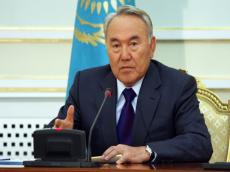|
|
TODAY.AZ / World news
Nazarbayev: Weak banks should be united
03 February 2017 [14:58] - TODAY.AZ

By Azernews
By Kamila Aliyeva
Kazakh President Nursultan Nazarbayev believes that weak banks that do not benefit the country's economy should be merged.
“The banking sector is weak,” Nazarbayev said at the enlarged session of the Government adding that “only four banks hold 80 percent of the assets of the banks.”
He also noted that during the crisis, many large companies took the mergers and acquisitions road, RIA Novosti reported.
“The banks should be merged or shareholders should bring their own money in capital if they want to save the bank,” Nazarbayev said adding that if economy doesn’t need them, they do not have the right to life while addressing the head of the National Bank Daniyar Akishev.
Kazakhstan has a two-tiered banking system. The first tier represents the National Bank of Kazakhstan (NBK), which reports to the president. The second tier includes 38 commercial banks, including one state-owned bank and 16 banks in which foreigners hold 30 percent or more of the bank’s shares.
A number of foreign stockholders entered the banking market from 2008-2012, including Russia's Sberbank, Israel's Bank Hapoalim, South Korea's Kookmin Bank, the Arab investment company Alnair Capital, Russia's VTB, and Islamic Al-Hilal bank from the United Arab Emirates.
The National Bank acquired the functions of a financial regulator after merging with the Financial Supervision Agency in April 2011, and is therefore charged with overall supervision of the banking sector.
The primary objective of the National Bank is to ensure price stability in the economy. To achieve this goal, the National Bank conducts monetary policy within the inflation targeting framework. The shift to an inflation targeting regime was announced on August 20, 2015.
In 2016-2017, the National Bank’s target is to achieve the annual inflation rate within a band of 6-8 percent. In the medium term, the National Bank aims at achieving the annual inflation rate of 3-4 percent in 2020.
According to statistical data, the inflation rate was 7.9 percent since January 2016 till January 2017. Food prices have increased by 9 percent, non-food items’ prices have gone up by 9.2 percent, and paid services’ prices have been raised by 5.3 percent in January 2017, compared to January 2016.
URL: http://www.today.az/news/regions/158282.html
 Print version
Print version
Connect with us. Get latest news and updates.
See Also
- 08 December 2025 [08:00]
Kremlin sees alignment with Trump’s new US security strategy - 05 December 2025 [23:23]
Kia celebrates 80th with new concept car - 05 December 2025 [22:49]
Certain citizens may face US entry limits - 05 December 2025 [21:42]
France targets Shein with temporary block - 05 December 2025 [20:50]
China launches longest nonstop flight - 05 December 2025 [09:00]
Teen social media accounts block in Australia - 05 December 2025 [08:00]
Android adds feature to mark urgent calls - 04 December 2025 [23:50]
Georgia bans foreign students in public universities - 04 December 2025 [23:23]
Ankara to deploy voice-guided AEDs across public spaces under 2026 regulation - 04 December 2025 [22:23]
Kahramanmara? reconstruction accelerates with 52,000 homes delivered
Most Popular
 European Union is once again promising Armenia what it cannot fulfill
European Union is once again promising Armenia what it cannot fulfill
 Pashinyan showed the wrong side of the Karabakh negotiations: there is no sensation for us, it is a shock for the Armenians
Pashinyan showed the wrong side of the Karabakh negotiations: there is no sensation for us, it is a shock for the Armenians
 Baku hosts Azerbaijan–Georgia Media Forum on public trust and information security
Baku hosts Azerbaijan–Georgia Media Forum on public trust and information security
 China launches longest nonstop flight
China launches longest nonstop flight
 OTS Chief stresses safe working conditions and cooperation for sustainable growth
OTS Chief stresses safe working conditions and cooperation for sustainable growth
 Southern Gas Corridor to channel most earnings to SOCAR and Azerbaijani state - Fitch says
Southern Gas Corridor to channel most earnings to SOCAR and Azerbaijani state - Fitch says
 Construction progresses on Nakhchivan railway segment bordering Armenia
Construction progresses on Nakhchivan railway segment bordering Armenia
